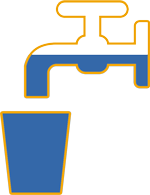Our Vision
A world with clean water and fertile soil achieved by reclaiming the nutrients from our bodies as elements in a life sustaining cycle.
Our Core Values guide our team as we work towards this vision.
Our Mission
The Rich Earth Institute engages in research, education and technological innovation to advance the use of human waste as a resource.
Theory of Change
Our Programmatic Goals below are designed to advance the global movement for a paradigm shift to revolutionize sanitation systems from ecologically harmful and water-intensive linear nutrient flows to beneficial circular resource management systems. To achieve this paradigm shift, we need:
- Demonstration Projects: It exists, therefore it must be possible.
- Regulatory reform: Because old rules don’t work to govern new ways of thinking.
- Applied research: To learn more about the impacts of conventional and innovative systems, and the opportunities for improving them.
- Education and outreach: To foster and empower new thinking and practices.
- Technological advancement: Increasing access to tools enables change. This need is being pursued through our spin-off company, Brightwater Tools.
Programmatic Goals
GOAL 1: Demonstration Projects
Implement community-scale systems for recycling nutrients from human waste to demonstrate the potential for reducing pollution, creating fertilizer, and conserving potable water.
- Create local implementations of cutting-edge sanitation solutions.
a. Build out and showcase local nutrient recycling infrastructure, including depots and installations in large-scale projects.
b. Recruit more urine donors and farmers who are committed to supporting our local research and demonstration activities. - Document our knowledge of community-scale systems in publications & other media to make available to a range of audiences.
- Support others in adopting these practices, according to their community needs.
a. Identify and support nascent implementation projects with the potential for large-scale funding and/or significant socio-environmental impact, ensuring that our services are financially accessible whenever possible.
i. Provide consultation.
ii. Foster networks/ connect people/projects into geographic hubs.
iii. Provide physical tools for urine recycling.
GOAL 2: Remove Regulatory Barriers
Identify regulatory barriers and create permitting pathways for nutrient cycling from human waste at the local, state and national levels.
- Partner with other organizations and continue the work of the Gold Ribbon Commission to promote comprehensive national-level regulatory reform.
- Support the state-by-state development of innovative regulatory pathways for collection, treatment, and application of fertilizer derived from human waste.
- Engage with local (county, city, village) officials as needed to support local implementations.
GOAL 3: Research
Conduct research to fill information gaps, address current needs, and generate new areas of investigation regarding the ecological impacts and social considerations of circular sanitation systems.
- We seek to conduct research in the following arenas:
- Full Toilet Waste Recycling: Expand the organization’s research scope beyond urine diversion to include all potential resources that are being wasted in conventional sanitation systems including liquid and solid wastes, greywater, and water conservation.
Agricultural Research: Understand the effectiveness of urine/feces-derived soil amendments for different crops and in diverse conditions, as well as for soil and environmental health. - Contaminants of Emerging Concern: Research contaminants potentially found in urine/feces-derived amendments with regard to removal technologies, public engagement, and effects on crops, soil and the wider environment.
- Social Research: Investigate user and stakeholder perspectives on nutrient recycling, technology, and agricultural practices to learn what works and what does not, including needs within communities that lack access to adequate sanitation, water, and/or nutrient resources due to economic, social, racial or other barriers.
- Full Toilet Waste Recycling: Expand the organization’s research scope beyond urine diversion to include all potential resources that are being wasted in conventional sanitation systems including liquid and solid wastes, greywater, and water conservation.
- Our research process is inherently iterative, involving conceptualization, investigation, implementation, reflection, evaluation and generation of new research intentions. We seek to:
- Enact participatory action research that identifies and brings together representatives from different sectors to share perspectives and solicit concerns and recommendations to best facilitate implementation of circular resource management systems that meet community needs and desires.
- Work both independently and through strategic partnerships and collaboration to further our mission.
- Inform and conduct life cycle analyses of various circular sanitation systems within the Institute’s research focus, accounting for the full chain of steps from collection of wastes to application of end products.
- Communicate research results to the wider research community as well as to other relevant audiences through publication in the peer-reviewed literature, writing for the “grey” literature, and presenting at conferences.
- Continue to evolve and implement a formal process to select research projects.
GOAL 4: Education and Outreach
Foster and empower ecological thinking and practices through co-developing, adapting, and deploying educational resources with communities of different contexts and scales.
- Local: Build community relationships to strengthen UNRP cultures of practice and inform community engagement strategies for future UNRP replications.
- Youth: Integrate peecycling into local school education; connect to environmental and sustainability curricular goals; and share learning tools with teachers/schools nationwide.
- Gardeners: Provide tools and resources for home gardeners; encourage open conversation about a practice often done in secrecy; document and learn from home garden practices with urine; and generate hypotheses for community science experiments.
- Communities: Foster co-design for adoption of nutrient cycling within diverse communities, including specific focus on key stakeholder groups including toilet users, engineers, technicians, farmers, and regulators, etc.
- Researchers: Create opportunities for researchers to collaborate; foster cross-pollination between research (including our own) and practice; and disseminate our own research results to wider research communities, as well as other relevant audiences.
Maintain active membership/contribution to existing networks including SuSanA, Ocean Sewage Alliance, LinkedIn (e.g. Urine Concentration Group), Egestebase - Municipalities: Communicate research findings (e.g. LCA & LCCAs) and resource recovery technology packages to spur funding for and adoption of nutrient recycling practices, and highlight the benefits of nutrient cycling in a range of areas including agriculture, improved environmental services, and water conservation.

